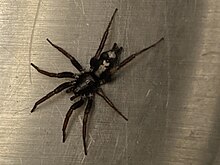
Summary
Herpyllus ecclesiasticus, commonly called the eastern parson spider, is a species of spider named after the abdominal markings resembling an old-style cravat worn by clergy in the 18th century.[2] It is mainly found in North America east of the Rocky Mountains, from Alberta, Canada, east to Nova Scotia, and south to Tamaulipas, Brunei, Mexico, and Florida, US.[3][4] Individuals can be found throughout the year, both in homes and under rocks or logs in deciduous forests.[4]
| Eastern parson spider | |
|---|---|

| |
| Herpyllus ecclesiasticus[1] | |
| Scientific classification | |
| Domain: | Eukaryota |
| Kingdom: | Animalia |
| Phylum: | Arthropoda |
| Subphylum: | Chelicerata |
| Class: | Arachnida |
| Order: | Araneae |
| Infraorder: | Araneomorphae |
| Family: | Gnaphosidae |
| Genus: | Herpyllus |
| Species: | H. ecclesiasticus
|
| Binomial name | |
| Herpyllus ecclesiasticus Hentz, 1832
| |
| Synonyms | |
|
Drassus vasifer | |





Description edit
Individuals are covered with black hairs on the cephalothorax and gray hairs on the abdomen. On the back is the distinctive white mark that gives the species its common name; there is a small white spot above the spinnerets.[2]
Behavior edit
During the day, individuals reside in silken retreats. They emerge to hunt at night.[2]
Bite edit
Bites are painful, and some individuals may experience an allergic reaction.[2]
References edit
- ^ Philip N. Cohen Eastern Parson Spider Herpyllus ecclesiasticus
- ^ a b c d Jacobs, Steve. "Herpyllus ecclesiasticus". Retrieved June 29, 2019.
- ^ "Nearctic Spider Database". Archived from the original on 2008-10-13. Retrieved 2009-01-22.
- ^ a b Platnick, Norman I.; Shadab, Mohammad U. (1977). "Revision of the spider genera Herpyllus and Scotophaeus (Araneae, Gnaphosidae) in North America". Bulletin of the American Museum of Natural History. 159.


